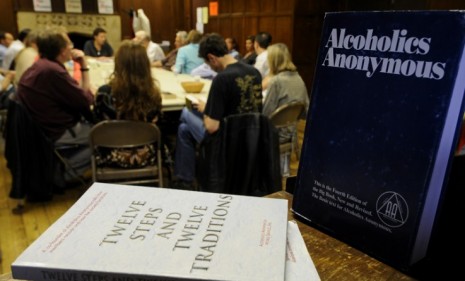Should recovering addicts really be anonymous?
Alcoholics Anonymous has long viewed secrecy as crucial to getting people to seek help, though some are questioning whether that's still really necessary

It's no secret that the second "A" in "A.A." stands for anonymous. But anonymity is harder and harder to come by in the age of social media and confessional chic. And many people who have overcome drug and alcohol problems are fueling that trend by writing revealing recovery memoirs. Is greater openness in the recovery world a good thing, or will it make people reluctant to seek help from groups like Alcoholics Anonymous?
Dropping anonymity would make recovery easier: "We are in the midst of a public health crisis when it comes to understanding and treating addiction," says Susan Cheever at The Fix. By sticking with its old-school principle of anonymity, A.A. has "taken on the air of a cult, with secret language and rituals," reinforcing the tired idea that people with addictions should be ashamed. That only makes it harder for people to speak frankly about their problems.
"Is it time to take the anonymous out of A.A.?"
The Week
Escape your echo chamber. Get the facts behind the news, plus analysis from multiple perspectives.

Sign up for The Week's Free Newsletters
From our morning news briefing to a weekly Good News Newsletter, get the best of The Week delivered directly to your inbox.
From our morning news briefing to a weekly Good News Newsletter, get the best of The Week delivered directly to your inbox.
Actually, secrecy still has its place: The shame of being identified as a recovering alcoholic or drug addict "may be narrowing to a vanishing point," says Victoria Pynchon at Forbes, but the raw struggle to conquer addiction is nothing anyone would be happy revealing on TV, Facebook, or Twitter. "In the age of confessionals, Alcoholics Anonymous has remained one of the few places where the CEO of Exxon could freely mingle with the janitorial staff over at Google" without fear of exposure. Surely there's some benefit in that.
But nobody is forced into secrecy: The criticism of A.A.'s anonymity makes no sense, says Addiction and Recovery News. "There is nothing in A.A.'s traditions that prohibits publicly identifying oneself as an alcoholic in recovery" as long as one doesn't reveal oneself as an A.A. member. If you want to share your story of recovery with the world, knock yourself out. If you want to become an activist, go right ahead. Just keep your word, and leave A.A. out of it.
A free daily email with the biggest news stories of the day – and the best features from TheWeek.com
-
 Political cartoons for February 1
Political cartoons for February 1Cartoons Sunday's political cartoons include Tom Homan's offer, the Fox News filter, and more
-
 Will SpaceX, OpenAI and Anthropic make 2026 the year of mega tech listings?
Will SpaceX, OpenAI and Anthropic make 2026 the year of mega tech listings?In Depth SpaceX float may come as soon as this year, and would be the largest IPO in history
-
 Reforming the House of Lords
Reforming the House of LordsThe Explainer Keir Starmer’s government regards reform of the House of Lords as ‘long overdue and essential’